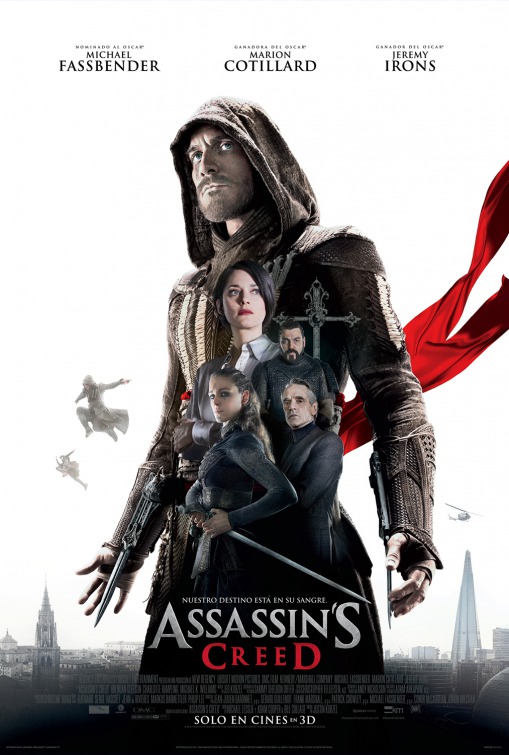Your Destiny Is In Your Blood
Director
Justin Kurzel
Starring
Michael Fassbender
Marion Cotillard
Jeremy Irons
The following is a bias disclaimer. I adore the Assassin’s Creed video games.. obsessively. Some would say this means I am best fit to scrutinise this release, others that my impartiality will be skewed. In truth, I cannot separate myself from my vast familiarity of the franchise so trying to experience this film without knowledge of the unspoken nuances, Easter eggs and probable future direction is frankly impossible. Bear this in mind.
At a young age Callum Lynch [Fassbender] witnessed the death of his mother, at the hands of his father, and has been in and out of correctional facilities ever since. His criminality finally catches up with him after he is sentenced to death for the murder of a pimp. Following the lethal injection he awakes in a privately owned facility in Madrid, Spain, run by the Abstergo company. Scientist Sophia Rikkin [Cotillard] explains that for all intents and purposes he is dead to the world but she needs his help. Abstergo are in possession of a machine called the animus which allows them to filter through the distinct coding in his DNA and access the memories of any individual he has descended from. Specifically they are interested in one particular ancestor who was the last known keeper of an artefact called the Apple of Eden, which is fabled to hold the key to subduing violence and aggression in humanity. With little choice in the matter, Callum is put into the machine and experiences the actions, emotions and memories of his ancestor Aguilar de Nerha who operated as an assassin for a secret brotherhood in fifteenth century Spain.
Adaptations in general have a record for being notoriously bad, either injecting a story that was never there or trying to oversimplify a much deeper experience. Over time we have seen an improvement in the treatment of certain adaptations; most recently with comics, proving you just need the right climate, execution and support. Video games have evolved from being puzzle based to story based and while there are still plenty of puzzle-centric games out there, a lot of the medium is driven on interesting characters and narratives as much as challenging objectives. As such, the transition to cinema has been simplified and over time we will no doubt see more video game adaptations that feel pretty close to the source material. Yet there is still one major flaw. As the gaming world developed, the stories employed were expanded to cover the 40+ hours of gameplay (without including things like side quests and secondary objectives). And though the video gaming world is trying new things, cinema hasn’t changed format dramatically for decades, so anything over two or three hours is considered rather long. Subsequently, condensing so much gameplay and lore into one film is always going to be a challenge and along the way, you are going to lose certain audience members. In my opinion, Assassin’s Creed is not only the best video game adaptation to date (which isn’t actually saying much), it’s a fantastic and highly entertaining feature. Having said that, its biggest weakness is that it inherits almost all of the flaws from the game, which fans will be able to overlook but newcomers may not.
To my mind, Kurzel gets so much right. If I were to draft up an Assassin’s Creed adaptation that took into account the gameplay mechanic, storytelling method and a whole host of tick-boxes that needed to be present, it wouldn’t look very different. In order to separate this critique, let’s initially divide the narrative between its contemporary and historic settings. Even in the games, the events in the present are bemoaned the most, to the degree that they appear less-and-less with every passing release. Having said that, understanding how the animus works (as well as the motivation for creating it) is so vitally important that to simply set it entirely in the past would be absurd. The film wastes no time in explaining the seriousness of the world Callum has grown up in and the centuries-long blood feud that he is unwittingly part of. The acting is extremely competent but I will admit there isn’t a great deal present to build on and none of the individuals involved ever really have to step outside of their respective comfort zones. The clear, overarching theme is children paying for the sins of their fathers and whether, given the choice, they would choose to continue their parent’s work or petulantly defy it altogether. The Abstergo institution is a wonderfully designed, cold installation littered with masses of artefacts, research and nods to the video games. The level of detail and care taken by the production design crew is impressive, with each room ranging from calming psychiatric care facility to high-tech prison; not to mention the corridors which reveal the old stone foundations on which this new structure is built upon – again, a running theme throughout. There will be certain hardcore fans who will balk at the animus rig (replacing the Matrix-style loungers) but I applaud it as a way of conveying to the audience how reliving the memories works and a pleasing visual edit between the period elements and modern setting.
Aguilar’s scenes will receive the lion’s share of the praise owing to the levels of action and general break from exposition. The locations, sets, costumes and props are all of an amazing quality and instil a rich level of realism and depth. More than that, enhancing the immersion, everything that takes place in Andalucía is presented in Spanish. I can’t tell you how much I love this. Too often audiences are subjected to pony accents or second-language deliveries for fears of certain people not wanting to read subtitles. This language divide, coupled with the strong colour palate and visual styling that contrasts with the modern setting, makes for a clear and exciting vision. I say clear.. I appreciate there’s an exceptionally large amount of smoke and I, for one, do not have a problem with that, especially as the events depicted are supposed to be hazy memories. The acting is brilliant again, bringing a combination of fanatical devotion on both sides (those of the Assassins and the Templars running the Spanish Inquisition) and terrifically choreographed stunt work to create compelling viewing. The last note I’ll make before getting on to the film’s foibles is Jed Kurzel’s score. I really enjoyed the haunting simplicity of what was done on Macbeth and the beautiful subtly here is just as engaging. Simplistic, thrilling and distinct, it complements the visuals wonderfully.
Other than voraciously absorbing all the flaws of the game there are a handful of issues with this release. First of all, it’s completely merciless when it comes to newcomers or casual viewers. If you don’t commit completely, many people will get lost, confused or irritated with certain developments. Personally, I’m always of the mindset that blockbuster movies go out of their way to slow pacing or development to cater for stragglers and I hate it. As I stated from the start of this review, I can fill in the gaps but I will admit there are certain things that could have been addressed to aid comprehension. Just as an example, in the very first game the main character is informed how the animus works by explaining that our DNA contains the genetic memories of our every ancestor. When the lead calls the idea ridiculous, the head of operations asks how birds know how to migrate and continues that animal instinct is just tapping into an instruction manual built on experience, the animus allows us to go deeper, in much greater detail. Something as simple as that exchange might have offered some expositional clarity; alternatively, it might have just confused matters further. The action deservedly merits a lot of praise but it is marred by two growing industry standards. First of all, we cover too many real achievements with computer generated imagery. I understand the necessity for such things but after a point you can erroneously chalk up a practical triumph to digital effects. Case in point, I heard that this film contains one of the highest freefall stunts in over thirty years but with the extensive use of CGI, you would be forgiven for assuming it was all constructed by computer. Secondly we have the editing. I enjoyed the action sequences but there is a popular Western motif which is to show things from multiple angles but heavily rely on close erratic images and cutting away before anything happens – to make the actors appear to move faster. It has an effect but not one of impact and downplays any importance or urgency. Then we have the unfortunate byproduct of focusing so intently on Callum’s story, drives and motivations, that Aguilar’s complexity suffers. What is sporadically presented to the audience is a single mission in Aguilar’s life, albeit one of extreme emotional significance. Despite this, we don’t really get to know the assassin as much as we could do. This is where the similarities between the film and the game separate as we spend so much time with the assassin in the games that they are clearly the main characters rather than the individual accessing the memories. Granted, Aguilar is very present throughout the film in the form of hallucinations, as Callum’s memories merge with those of his ancestor’s, warping his hold on reality, but this doesn’t really give us any insight into anything about him as a person. We also have franchise problems. Television episodes sow seeds of things to come and are rewarded for their foresight. Films don’t garner the same praise and characters or story elements that will be revisited later are deemed incomplete, unfulfilling or unnecessary. This is far from an isolated incident and as sprawling franchises are planned in advance, they are becoming more prevalent throughout big tent-pole releases. Finally, we have the Warcraft similarities. Warcraft was created by avid fans and released mid-2016 to a fairly lukewarm reception; unless you like the games. Opening text blocks and world-setting prologues can only do so much and having a degree of foreknowledge of the game’s characters, settings or mechanics helps immensely. As with Warcraft, the same can be said of Assassin’s Creed.
Before closing, I appreciate that I am very much in the minority and several other critics have absolutely eviscerated this film. Personally, I can understand why. It’s executed with a level of seriousness, the action is predominantly in-camera and well handled, the story is far from simple or dumbed down and the acting has an air of complexity to it. And yet it’s being labeled as dull, often by those who praised mediocre releases like Jurassic World for being fun and Interstellar for being layered; neither of which is entirely true. As a fan, I’m extremely excited by the prospect of future Assassin’s Creed titles with the potential for settings and locations being incredible and exploring the conspiracy-style involvement of the Templars in our own society (Hail Hydra) should be great. To those who are on the fence, I would highly recommend giving it a go if only for the fact that the concept is so much more unique and original than the standard fare.
Release Date:
1st January 2017
The Scene To Look Out For:
**Spoilers**
As the film trundled along I was rather happy with everything. Replicating the gaming elements and tropes was nice and never felt forced. The relationships between the fathers of the cause and their offspring was nice and the Spanish events were beautifully crafted. But it wasn’t until the end that I was really filled with a sense of giddy wonder at the future prospects of the film. In truth, if this was something in any other film, I might dismiss it but it ignited the exact same flurry of joy I experience whenever an Assassin’s Creed game gives a nod to where future games may progress. With the animus pushed to its limit and Callum’s brain synching with so many different strands of memories, he is presented with a vision of several ancestors who have served the order throughout history, outfitted in various garb. These aren’t ghosts or visions, they are merely pathways to explore, even the conversation with his own mother isn’t a conversation but a projection from his own subconscious based on her biological coding. I’m sure it baffled a lot of people but as such a fan of the series all I saw was the potential for countless stories and settings that could be utilised in upcoming releases.
Notable Characters:
I love Fassbender, to me the man can do no wrong. Here he plays a resilient, passionate and aggressive man who never processed the sorrows of his life, leading him to an eventual end (in the form of his execution). Additionally, he also portrays the role of this character’s ancestor who, while possessing similar traits, has been nurtured in the fold and harnessed his abilities. The intensity is wonderful, the manipulation he experiences by all involved is decent and he is the perfect person to carry this series forward.
Highlighted Quote:
“People no longer care about civil liberties, they care about standards of life”
In A Few Words:
“A solid, bold adaptation but through its loyalty, inherits all of the source material’s flaws”
Total Score: 3/5

![The Red Right Hand Movie Reviews [Matthew Stogdon]](https://reviews.theredrighthand.co.uk/wp-content/uploads/2021/12/cropped-header1.png)



